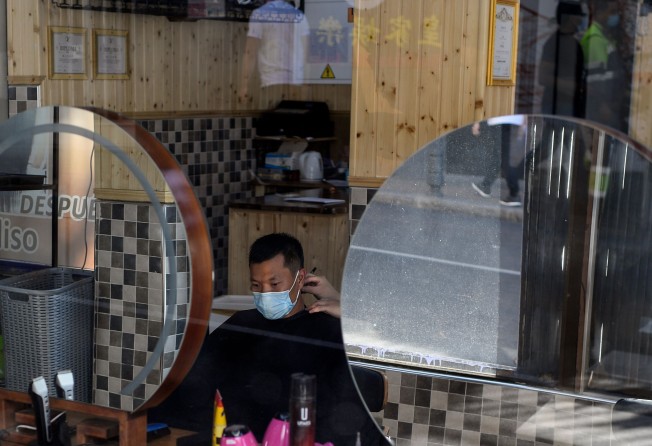Spain wants to lock down capital Madrid; UK experts warn coronavirus out of control
- Madrid is leading the resurgence of the virus in Spain and Europe
- UK faces tighter Covid-19 rules to bring outbreak under control, with scientists saying infections have jumped fourfold

The government of Madrid, the region in Europe where a second coronavirus wave is expanding at the fastest rate, rejected a Spanish government plan that imposes stricter mobility curbs and limits on social gatherings in the capital and its suburbs, deepening a domestic confrontation over the response to the pandemic.
Madrid’s refusal to adopt national standards approved by 13 of Spain’s 19 regions and autonomous cities represented a new setback for Prime Minister Pedro Sanchez’s left-wing coalition, which is trying to push for a stricter response in the opposition-ruled Spanish capital.
The deadlock also exposed some of the pitfalls of the country’s highly decentralised political system, irritating many Spaniards and undermining their trust in politicians’ handling of a worrying surge in virus cases more than six months after the pandemic first overwhelmed Spain.
Madrid is leading the resurgence of the virus in Spain and Europe. The region has a two-week infection rate of 784 cases per 100,000 residents, which is 2 1/2 times higher than the national average of 294 cases and seven times higher the average rate in Europe, which stood at 94 per 100,000 residents last week, according to EU statistics.
The greater Madrid region has 6.6 million residents and so far, the authorities have imposed a partial lockdown on just over a million of them, mostly in poorer areas south of the city.
There, people cannot leave their neighbourhood except for work, school or medical reasons.
But they are not confined to their homes and can circulate freely in their own district although parks are closed and bars and restaurants can only operate with limited opening hours and seating capacity.
It was not immediately clear how the new mobility restrictions would work, with details to be published in the official government bulletin in the coming days.
Spain is currently fighting a second wave of the virus, which has now killed more than 31,000 people and infected close to 760,000 in what is the highest infection rate within the European Union.
Global coronavirus cases approached 34 million on Thursday, with Germany reporting the highest number of infections since April.
Due to the high number of coronavirus infections, the German government on Wednesday classified individual regions in 11 European countries including all of Belgium, Iceland, Wales and Northern Ireland as high-risk areas.
Meanwhile, it also lifted a blanket travel warning in place during the coronavirus pandemic for a total of 160 countries outside the EU. Each country in the world will now be assessed individually.

In the UK, health experts admitted that the coronavirus was out of control as case numbers and hospital admissions rise, despite a slew of new restrictions on social gatherings.
“Things are definitely heading in the wrong direction,” UK chief scientific adviser Patrick Vallance told a government press conference on Wednesday, as a further 7,108 cases and 71 deaths were reported.
As England’s chief medical officer, Chris Whitty, warned that hospitalisations and admissions to intensive care were also rising, Vallance added: “We don’t have this under control at the moment”.
On Thursday, British scientists reported that the rate of coronavirus infection across England had jumped fourfold in the last month and even higher in regions like northwest England and London.
A government-commissioned study that randomly tested tens of thousands of people in the community found that about one in 200 people across England are infected with the coronavirus, an increase from about 1 in 800 people in early September. They noted that the steep rise in cases began in August – when the UK government launched a month-long promotion offering people steep discounts to eat out at restaurants
More than 42,000 people have died from Covid-19 in Britain, the worst toll in Europe, despite a nationwide stay-at-home imposed in late March.
The lockdown was eased in June but authorities have in recent weeks reimposed restrictions on social gatherings, including a ban on groups of more than six and early closing for pubs.
Standing alongside Vallance and Whitty, Prime Minister Boris Johnson said it was “still too early to tell” if these would have an effect and urged people to follow the rules.
“If we put in the work together now then we give ourselves the best possible chance of avoiding that outcome and avoiding further measures,” he said.
Health Secretary Matt Hancock later offered to consult parliament and “wherever possible” hold votes before any new national coronavirus measures came into effect.
Elsewhere, Greek anti-riot police in Athens on Thursday fired tear gas toward hooded youths who threw firebombs and flares at them during a protest by pupils over the risks of coronavirus in schools.
The skirmishes between the police and the small group flared outside parliament as some 3,000 people, mainly high school pupils, demonstrated. Hundreds of schools around the country are shut by sit-ins, with pupils protesting against the education ministry’s decision to allow classes of up to 30 participants at a time of increasing coronavirus infections.
Nearly 400 people have died in Greece from the virus since February, with the infection rate accelerating from August onwards.
The Dutch government’s statistics office said the death toll from the peak of the coronavirus outbreak is significantly higher than the official figures published by the country’s public health institute.
The Central Bureau for Statistics reported on Thursday that just over 10,000 people died of Covid-19 in March through June this year as the first wave of the pandemic swept across the Netherlands. The official total for the entire outbreak stands at around 6,400 but the public health institute has always acknowledged that it includes only people who died after a positive coronavirus test and that many people died without being tested.
The statistics office says that based on doctors’ cause of death declarations, 7,797 died of Covid-19 from March to the end of June. A further 2,270 people died of suspected Covid-19.
The official death toll for those months, as reported to the public health institute by local health authorities, was 6,115.
The United Arab Emirates recorded its highest daily total of coronavirus infections on Thursday since the start of the outbreak, with 1,158 new cases. The Gulf Arab state had registered a record 1,100 cases in 24 hours on Wednesday. Daily infection numbers have surged over the past two months from 164 on Aug. 3. Authorities have blamed people’s poor adherence to social distancing measures.
The UAE has a high per capita rate of Covid-19 tests. The country of around 9.9 million people has carried out 9,798,960 tests so far, the government statistics authority says.
The UAE’s nationwide tally stands at 95,348 infections and 421 deaths. The government does not disclose where in the seven emirates they occur.
Associated Press, Agence France-Presse, Reuters